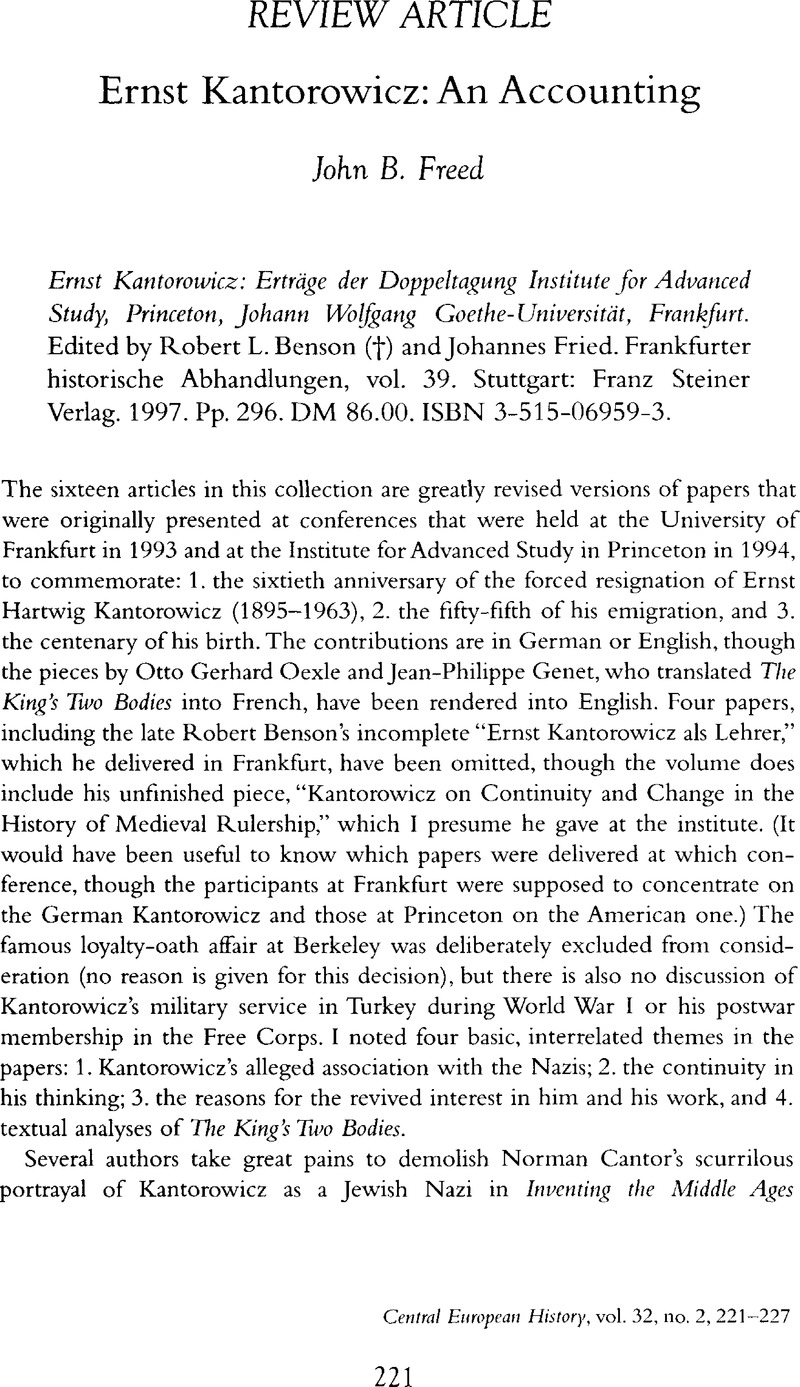Article contents
Ernst Kantorowicz: An Accounting
Published online by Cambridge University Press: 16 December 2008
Abstract

- Type
- Review Article
- Information
- Copyright
- Copyright © Conference Group for Central European History of the American Historical Association 1999
References
1. Benson, Robert L. (†) and Johannes, Fried, eds., Ernst Kantorowicz (Stuttgart, 1997), 27, n. 54Google Scholar; 32, n. 76; 75; 110–11; 122–23, n. 69; 124–26; 138–43.
2. See, for example, the exchange in The New York Review of Books, 13 August 1992, between, on the one hand, Robert Bartlett, who had reviewed Inventing the Middle Ages, and, on the other, Robert L. Benson, Ralph E. Giesey (both students of Kantorowicz and contributors to this volume), and Margaret B. Ševčenko. Ihor Ševčenko's piece, “Ernst H. Kantorowicz (1895–1963) on Late Antiquity and Byzantiuns,” also appears in this volume.
3. Quoted by Lerner, Robert E., “‘Meritorious Academic Service’: Kantorowicz and Frankfurt,” in Ernst Kantorowicz, ed. Benson, and Fried, , 27.Google Scholar
4. Kantorowicz, Ernst, “Das Geheime Deutschland: Vorlesung, gehalten bei Wiederaufnahme der Lehrtätigkeit am 14 November 1933,” in Ernst Kantorowicz, ed. Benson, and Fried, , 80Google Scholar: “gegen alles Gewaffen sind die Herrscher des ‘geheimen Deutschland’ gefeit, und man wird ihrer nicht habhaft, indem man ihr Bild auf die Strasse zerrt, sie dens Markt anähnelt und dann als eigen Fleisch und Blut feiert!”
5. Ibid., 82–83: “hellenische Götterwelt, civitas Dei, hurnana civilitas.”
6. Ibid., 80: “ein solches geheimes Reich, das niemals da war und doch ewig ist … Aber wer Augen hat zu sehen und Ohren zu hören, der weiss, dass fast zu alIen Zemten … ein andres Deutschland gewesen ist, welchern jenseits des öffentlmch sichtbaren Reiches Wesen und Leben beschieden war.”
7. Freedman, Paul and Spiegel, Gabrielle M., “Medievalisms Old and New: The Rediscovery of Alterity in North American Medieval Studies,” The American Historical Review 103, no. 3 (1998): 677–704.CrossRefGoogle Scholar
8. For example, Eckhart Grünewald,”‘Not Only in Learned Circles’: The Reception of Frederick the Second in Germany before the Second World War,” in Ernst Kantorowoicz, ed. Benson, and Fried, , 170Google Scholar, cites a three-page passage in which Herbert Grundmann addressed the question in 1935 “in wieweit er (Frederick II) blutsmässig mit Deutschland verknüpft war.”
- 1
- Cited by




